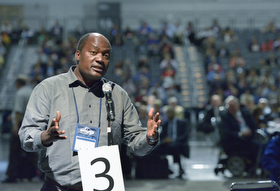“We still believe literally that the Bible is the word of God,” says the Rev. Forbes Matonga, pastor of the Nyadire United Methodist Mission in Zimbabwe and a proponent of the Traditional Plan. “We don’t believe that the Bible is silent on this matter because we do have scriptural references we can point to.”

Photo by Paul Jeffrey
“The traditionalist plan … puts in a far greater system of accountability,” says Bishop Sandra Steiner Ball, resident bishop of the West Virginia Conference and one of the moderators for the Commission on a Way Forward.
“It provides penalties for those who act against the Discipline’s guidelines.”
The traditional plans will be under consideration at the special General Conference in St. Louis on Feb. 23-26. The two will be considered alongside plans that would loosen or remove church restrictions on same-sex marriage and ordination of gay clergy.
Other plans submitted to the denomination’s legislative assembly include the One Church Plan (recommended by a majority of the Council of Bishops), the Connectional Conference Plan and the Simple Plan.
The United Methodist Judicial Council in October ruled some elements of the Traditional Plan unconstitutional, so amendments would be needed before passage. The problems center on stronger enforcement of some rules for pastors and bishops more than others, as well as due process concerns.
The ruling also affects parts of the Modified Traditional Plan that overlap with the Traditional Plan.
Under the traditional plans, the ban against self-avowed practicing homosexual people being ordained as United Methodist clergy continues, as does the prohibition on gay weddings.
One of the Traditional Plan petitions inadvertently omitted the word “practicing” from the phrase “self-avowed practicing homosexual,” said the Rev. Tom Lambrecht, vice president and general manager of Good News. There will be an amendment introduced to fix the error, he said.
Plan options for GC2019
The Connectional Conference Plan
The One Church Plan
The Simple Plan
The consequences for violating the Book of Discipline’s rules on homosexuality would be tough, and would apply to local churches and pastors.
The traditional plans direct that those who will not conform to the Discipline be “encouraged to form something similar to an ‘autonomous, affiliated or concordat church.’”
In other words, leave The United Methodist Church. Churches that leave can use the United Methodist name and logo until 2021.
The Modified Traditional Plan came about because the crafters of the original Traditional Plan had only a short time to work on it. The updated plan beefs up enforcement against bishops who violate the Book of Discipline and provides $200,000 grants for annual conferences that leave the denomination over the issue of homosexuality.
“Some of us felt that (the Traditional Plan) needed to be more complete than it was, especially the whole accountability issue,” said the Rev. Maxie Dunnam, president emeritus of Asbury Theological Seminary in Wilmore, Kentucky. “We were trying to perfect (accountability in the plan) so there would not be constant trials. We needed to make the issues so clear that there would not be any question … whether a person had violated them or not.”
Watch videos to learn more
Renfroe prefers gracious exit to forced unity
Renfroe suggests that The United Methodist Church should offer local churches the opportunity to leave the denomination if agreement cannot be found on issues around sexuality.
Lambrecht discusses Traditional Plan creation
Lambrecht talks about how the Traditional Plan was almost dropped from the plans to be considered by the Council of Bishops.
Like what you're reading? Support the ministry of UM News! Your support ensures the latest denominational news, dynamic stories and informative articles will continue to connect our global community. Make a tax-deductible donation at ResourceUMC.org/GiveUMCom.



